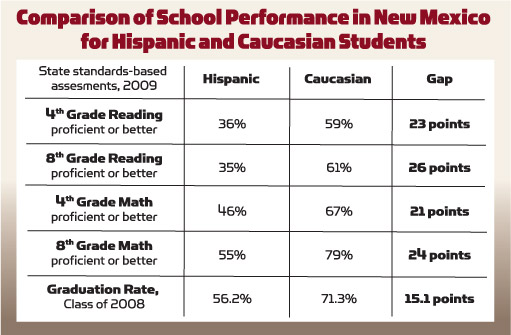Roundhouse conversations on touchy social topics don’t unfold all that differently from debates at the bar, in a classroom or over a dinner table. The Hispanic Education Act sponsored by Rep. Rick Miera (D-Albuquerque) spurred two-and-a-half hours of deliberation on the House floor on Wednesday, Feb. 10. Talk ranged from examinations of legislators’ personal histories and racial backgrounds to speculation over whether the state’s count of Hispanic students is accurate.The act is meant to address New Mexico’s Hispanic achievement gap, which the Legislative Education Study Committee breaks down like this: 56 percent of Hispanic students graduated high school in 2008, while 71 percent of white students graduated. Among those who pursue college, 57 percent of Hispanic students take remedial classes, compared with 36 percent of white students.Miera’s bill creates a Hispanic education liaison in the Public Education Department (PED) and an unpaid advisory council. The measure doesn’t ask for money. The liaison and council would study the educational system’s relationship with Hispanic students, encourage parents to be involved and find ways to partner with organizations to create opportunities. Opposition Legislators pelted the measure with criticism. Since more than half (56 percent) of the state’s student population is Hispanic, Rep. Ben Rodefer (D-Corrales) asked: Isn’t the Public Education Department already the office of Hispanic education? "If the majority of students are Hispanic, I don’t see why we have to create an advisory committee," he said. Rep. Anna Crook (R-Clovis) said she didn’t understand the discrepancy in statistics "since we’re all New Mexicans." Rep. Nora Espinoza (R-Roswell) suggested that students with Hispanic surnames might check the Hispanic box even if they’re white. "Maybe there’s a larger Anglo population that isn’t making it and is dropping out," she said. All students should be educated equally, she added, "not one above the other." PED and each school call for for parental involvement, said Rep. Janice Arnold-Jones (R-Albuquerque), but some parents are turned away. She suspected the problem might be their perceived socioeconomic status—not their ethnicity. Arnold-Jones also opposed the measure because it didn’t include cash for a PR campaign. "I’m struggling to see what truly, truly changes," she said. She also said it bothered her because it would become a statute that implies only Hispanics are important.Rep. Jane Powdrell-Culbert (R-Corrales), who is African-American, said she didn’t favor the legislation and would have opposed an African-American act in the same vein. When she was growing up, she said her community took pride in all young people. Rep. Kiki Saavedra took her under his wing when she was 13 or 14, she said, and expected her to do well in college not because she is black, but because she was part of a community that had high expectations for young people. "Listening to these discussions is like regressing back to the ’60s," she said. Reinstating boundaries only creates a new generation of racism, she finished. Support Gov. Bill Richardson mentioned this legislation in his State of the State address at the beginning of the session. "I want New Mexico to be the first state in the nation to have a Hispanic Education Act," he said. "We will be held accountable for results by creating an annual report card on the status of Hispanic education." Students who don’t finish high school or college bring less money to New Mexico, suggested Miera, the representative who sponsored the measure. He said he doesn’t know why the discrepancy exists, which is why it was important to pass the bill and begin acknowledging and looking into the problem.A legislative veteran of 23 years, Rep. Luciano "Lucky" Varela (D-Santa Fe) said the state has created departments for African-Americans and passed an Indian Education Act, and that this act was also critical.A collaborative structure that includes parents and community is essential to turning these numbers around, said Rep. Danice Picraux (D-Albuquerque). She added that the act helps parents understand what it takes to make students successful.Even though school populations are minority-majority, said Rep. Antonio "Moe" Maestas (D-Albuquerque), that doesn’t mean students don’t face racism. "There isn’t a force field around the state of New Mexico that doesn’t allow institutional racism inside," he said. "We have an Anglo-Saxon tradition in this state. The words I’m speaking come from England." Results After a long debate, the Hispanic Education Act passed the House 44-25. A similar measure with the same name sponsored by Sen. Bernadette Sanchez (D-Albuquerque) passed the Senate 24-16 later the same day. There are minor differences between the two that need to be hammered out. A Hispanic Education Act is heading to the governor for signature.
The 2010 legislative session was scheduled to end at noon on Thursday, Feb. 18, though there’s been talk of a special session.



